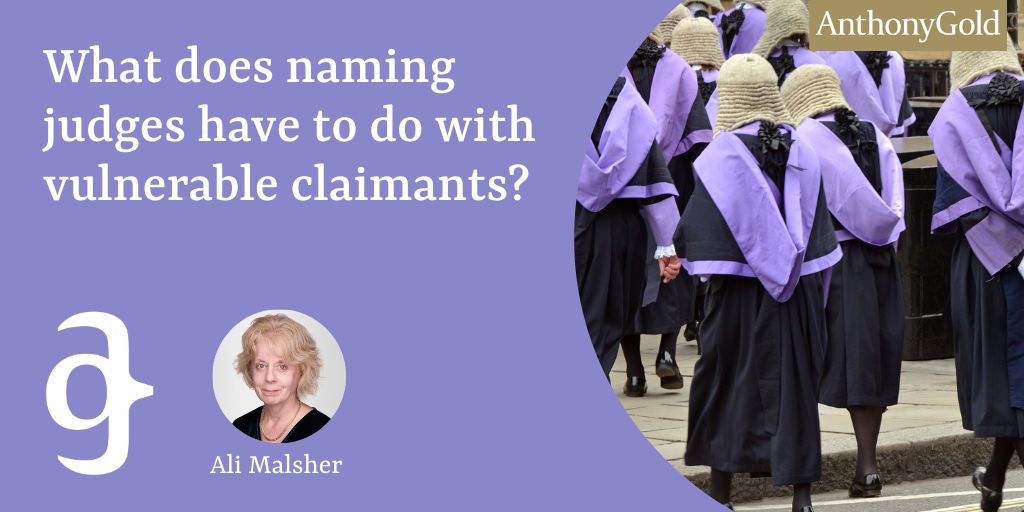What does naming judges have to do with vulnerable claimants?

At the end of January, the Court of Appeal determined a case brought by an enormous number organisations in relation to the previous judges who had dealt with the tragic case of Sara Sharif. (Tickle & Anor v The BBC & Ors [2025] EWCA Civ 42,)
Sara Sharif had been murdered by her father and step-mother and, following that murder, several journalists sought information from the family proceedings regarding the history of events legally. At the time, Mr Justice Williams unilaterally made an order that the judges who had been previously involved in proceedings should not be named, focussing on an Article 8 right. The matter came before the Court of Appeal fairly quickly and the Court of Appeal indicated that the judge had no jurisdiction to anonymise the historic judges either at that time or thereafter and was wrong to do so. Further, in essence, they said that the whole idea of anonymising judges was misguided. There were a number of criticisms of the order as it was made but in essence there was agreement for the need for transparency and openness in the administration of justice.
The issue therefore was that the judges need to be named but it should be seen in the context of increasing pressure to name all involved in legal claims. There has been a sea change in how these matters could be dealt with.
For many years clin neg and PI practitioners have routinely settled cases informally, sought court approval in relation to same and at the same time applied for an anonymity order for their client. For many years these have routinely run through the system without issue. The NHS tends to be neutral on these matters as do most insurers. It is accepted practice that claimants who are protected parties, either by reason of age or capacity, are generally not named in many cases.
At the end of last year, this idea was turned on its head. In the case of PMC (a child by his mother and litigation friend FLR) v A Local Health Board the emphasis changed to why is anonymity needed and the bar for obtaining anonymity orders should be very high indeed. Far from being established practice routinely executed on most cases it potentially becomes a difficult threshold.
Nicklin J had a number of arguments in relation to this but one of them was that in essence, when claims are issued, they are not anonymised. That information is now available (as are the pleadings) routinely. They are available in the public domain and therefore anonymising them at the end of the case is useless. In essence, the cat is out of the bag.
The logical development is therefore at the time of issuing proceedings, an application needs to be made for an anonymity order at the start. It is difficult to see how the Masters of the King’s Bench Division for example are likely to take to that prospect and no doubt they have already considered the difficulties. It does however mean that should there be a challenge or should a judge decide not to anonymise at a later stage in proceedings, the damage to the claimant’s potential anonymity is done.
Most of this is as a result of the information provided on the CE Filing electronic system that goes with the courts. Westlaw, who routinely publish this information, apparently confirmed that they can deal with the anonymity order within 24 hours so that everything is anonymised, but as indicated that is often at the end of the case, not at the start.
There is an increase in pressure to open the family courts to provide greater transparency about how justice is provided. The administration of justice should be open and transparent. This case, and the Nicklin case before it, indicates that the emphasis of the judiciary is very much more for open naming than for protecting particular individuals.
Vulnerable claimants now need potentially some protection at the beginning of a case. How that will work in practice is not clear, but this latest judgment in relation to the judiciary sends clear messages that vulnerable claimants by reason of age or capacity need to be protected at the outset not at the end.
It is for practitioners to identify who may or may not be affected by these potential issues. Although the Nicklin case is going to appeal, it clearly hasn’t been appealed in quite the same speedy format as the Sherif case. In the interim, the emphasis is on disclosing all details including the names of the protected parties and that is something that practitioners need to think very carefully about before they take the step of issuing court proceedings.
* Disclaimer: The information on the Anthony Gold website is for general information only and reflects the position at the date of publication. It does not constitute legal advice and should not be treated as such. It is provided without any representations or warranties, express or implied.*
No comments